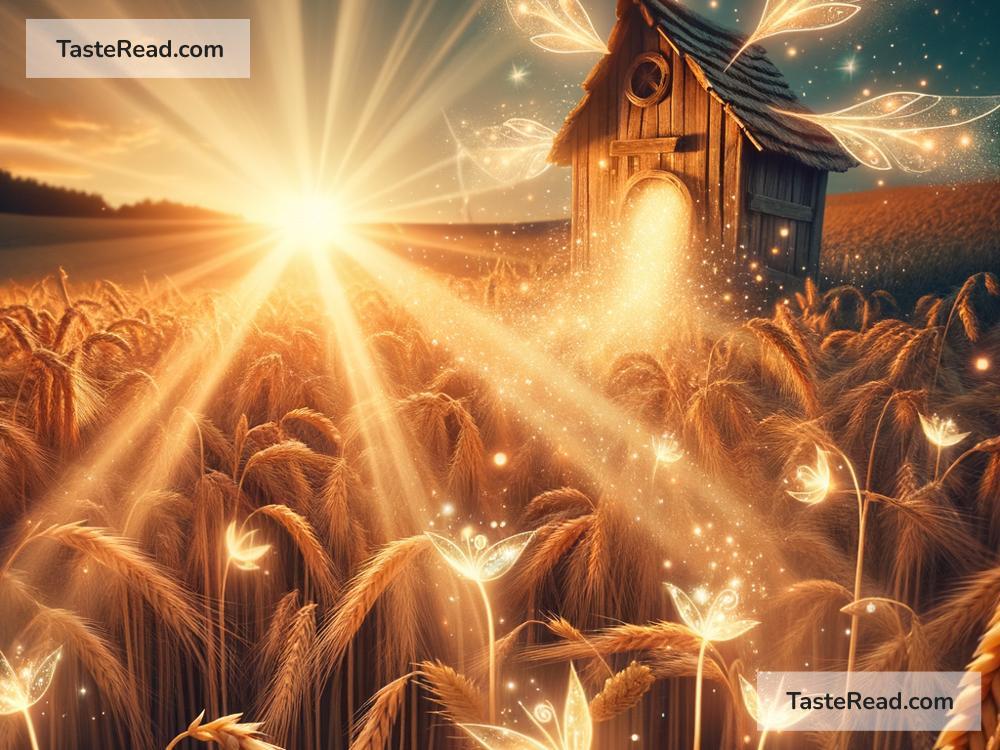The Legend of the Magical Wheat Field
Once upon a time, in a small village surrounded by green hills and a clear blue sky, there was a story passed down from generation to generation. This story spoke of a magical wheat field hidden deep in the countryside. The villagers believed that the golden wheat in this field held special powers. It could heal the sick, calm the troubled, and bring luck to those who were lost. But finding the magical wheat field was not easy—it was hidden from sight and could only be discovered by someone pure of heart.
The legend began long ago, when the village was struggling to survive. The harvests had failed, and many families didn’t have enough food to eat. Rivers ran dry, and the once-lush green hills turned brown under the hot sun. Everyone in the village prayed for a miracle. That’s when a rumor began to spread about the magical wheat field. It was said that whoever found it would be blessed with enough wheat to feed not just their family, but the entire village.
One day, an orphan boy named Leo decided to search for the field. Leo didn’t have much—his parents had passed away, and he lived alone in a small hut on the edge of the village. But Leo had a kind heart. He often shared his meals with birds, helped elderly villagers without being asked, and always stayed hopeful, even when the world seemed unfair.
Leo asked the village elder about the magical wheat field. The elder smiled but warned him: “The wheat field can’t be found with a map or directions. You must listen carefully to your heart, and it will guide you. Remember, greed and selfishness will hide the field from your eyes.”
Leo packed a small bag with some bread and water and set out early the next morning. He walked for hours, then days, exploring every hill and valley around the village. He met many challenges along the way. A heavy storm soaked him to the skin, and he had to climb steep rocks that scraped his knees. But Leo didn’t give up. He would often stop and think about the villagers—how hungry they were, how their eyes sparkled whenever they talked about the magical wheat field. “If I can just find it,” he thought, “I can help everyone.”
One warm afternoon, while resting under a tree, Leo noticed a butterfly fluttering nearby. The butterfly had golden wings that shone brightly in the sunlight. It flew close to him and seemed to dance in circles. Leo felt a strange pull in his heart, as if the butterfly was encouraging him to follow. He stood up and walked after it, letting his heart guide his steps.
The butterfly led him to a quiet valley surrounded by tall trees. To Leo’s surprise, he saw golden wheat swaying softly in the breeze—more beautiful than anything he had ever imagined. “This must be the magical wheat field!” he thought. He ran into the field and touched the wheat. It felt warm, almost alive.
Suddenly, the air sparkled, and a gentle voice spoke from nowhere. “Leo,” the voice said, “you have found the magical wheat field because your heart is pure. You searched for this field not for yourself, but to help others. You may take as much wheat as you need.”
Leo thanked the voice and carefully gathered bundles of wheat, enough to fill his small bag. As he left the valley, the field disappeared behind him, blending into the trees and hills as if it had never been there. But the magic had already begun.
When Leo returned to the village, he shared the wheat with everyone. The moment they baked bread from it, something incredible happened. The village’s crops began to grow again, rivers were filled with fresh water, and every sick person healed completely. The villagers were amazed and grateful. They praised Leo for his bravery and kindness, calling him the savior of the village.
Though the magical wheat was eventually used up, its blessing stayed with the village forever. Each year, their harvests were abundant, and no one in the village ever went hungry again. It was said that the magical wheat field still existed somewhere in the countryside, waiting for the next pure-hearted soul to discover it.
The story of the magical wheat field teaches us an important lesson: kindness, selflessness, and listening to your heart can lead to incredible things. Leo wasn’t the strongest, richest, or smartest person in the village, but his desire to help others made him a hero. The villagers often told this story to their children, reminding them that true magic lives in a kind heart and a willingness to give without expecting anything in return.
And who knows? Maybe the magical wheat field is still out there, waiting for someone like Leo to find it. After all, the world could always use a little more magic.


